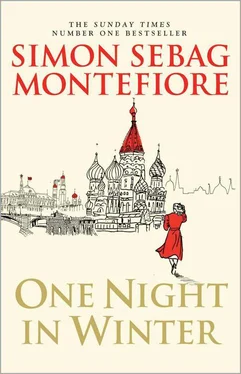Satinov kissed her forehead. ‘Mariko won’t be affected,’ he replied. ‘Even for George, it won’t be as bad as you fear.’
Moments later, Genrikh and Dashka Dorov arrived along with the other parents. Serafima’s father, Constantin Romashkin the screenwriter, was there too; Satinov knew that Sophia was filming. Tamriko stood next to Satinov and she slipped her hand into his and he squeezed it, noticing with a sudden twinge of sadness – or irony that the Dorovs were doing exactly the same thing. Irina Titorenka and Inessa Kurbskaya were alone.
Director Medvedeva was still suspended so it was the mathematics teacher, old Comrade Noodelman, who opened the door and summoned them in.
‘Please be seated and I hand the floor to Comrade Colonel Likhachev who is here to brief you,’ said Noodelman.
Colonel Likhachev, in army uniform, greeted Comrades Satinov and Dorov, but merely nodded at the women. What a charmer he was, this torturer! Satinov pushed to the back of his mind the thought that this degenerate had had control over his little Mariko.
Likhachev blinked as if unaccustomed to the wholesome brightness of this school room with its happy posters and jolly geraniums. Unzipping his leather case, he pulled out a beige file marked ‘MGB’ – Ministry of State Security – and ‘Top Secret’. He slipped a single paper out of the folder.
‘Comrades and citizens,’ he began grandiloquently. ‘The children, all pupils at School 801…’ He read out their names: George Satinov was the first. Tamriko’s grip had tightened on Satinov’s hand and he imagined that Dashka’s must be clasping Genrikh’s fiercely too because both mothers would be thinking of their younger children, fearing prison. Mariko was mentioned. Then there was Minka Dorova. Her mother’s face froze as she waited for the next… Yes, Senka Dorov. Dashka moaned slightly. Satinov imagined he could hear all their hearts beating in unison but perhaps it was just his own for suddenly he found himself suffering not just for one woman and her children but for two.
‘All of the above have signed confessions of conspiracy to overthrow the Soviet State and therefore have been liable under Article 158 to be sentenced to between ten and twenty-five years and, for those over twelve years old – that is all of the above criminals except Mariko Satinova, six, and Senka Dorov, ten – to the Highest Measure of Punishment.’ Death!
Tamriko gasped, and her hand shook in Satinov’s; Dashka’s free hand went to her lips.
Likhachev looked up at them and then continued reading. For a moment Satinov questioned his folly in advising Genrikh Dorov to order the children to sign the confessions. Had he made a terrible mistake? Had Abakumov – and behind him Stalin – tricked them all?
‘However,’ continued Likhachev, ‘three judges have decided not to proceed on this basis but to suspend formal judgment owing to the youth of the said criminals, who are instead to suffer the following punishment.’
The room was so silent that Satinov thought he could hear the swish of sweepers’ brooms in the streets outside.
‘We sentence them to one month’s exile, if necessary accompanied by tutors or nannies, in Alma Ata, Turkestan. Parental visits allowed weekly.’
Tears ran down Tamriko’s cheeks: tears of relief. Four weeks exile with staff was a summer holiday, as good as it could possibly be – even for Mariko who could go with her beloved nanny Leka.
As they left the director’s office, under his breath, Satinov thanked Comrade Stalin for his good sense, his justice. Satinov knew that the Aviators’ Case might catch up with him, if Stalin wanted it to do so, but that seemed unlikely. The children were free and both Tamriko and Dashka were safe. That was all that mattered. He watched the two women talking a few steps ahead, admiring them and wondering how on earth he had managed to have both in his life, so he was scarcely listening when he found Genrikh Dorov keeping step with him.
‘It’s a relief that this case has ended harmlessly,’ said the Uncooked Chicken as he peered round to check that no one was listening. ‘But I’m afraid, Comrade Satinov, I must warn you, as a friend, that there are many irregularities in the management of the Air Ministry and the Satinovgrad Aeroplane Factory. It will take me a couple of weeks to finalize my report and show it to the Central Committee. When the time comes, we’ll have to meet to iron out the problems. But I promise not to keep you for too long.’
SERAFIMA, LIKE THE others in the Children’s Case, had spent a month’s exile in Central Asia. She had shared an apartment with Minka and Senka, with the Satinovs right next door (while Andrei, with a smaller budget, stayed in a room across town), and her parents had lent her their maid, so that, apart from the blistering heat, this community of young exiles had actually managed to enjoy the trip. Serafima and Frank had written to each other every day, and sometimes they even managed to book a call at the post office so that, over a clanging line, she could hear his voice as they planned their new life.
On the day she arrived back home in Moscow, her parents were not at home.
‘Your mama’s on set,’ said the driver as the Rolls headed up to the Mosfilm Studios in the Sparrow Hills. Once she had passed the mythically muscular statue of the Worker and Collective Farm Woman outside, she was directed to Studio One.
Every road in that mini-city of cinema seemed to lead to her mother. ‘She’s down there,’ cried a grip, directing her into the huge hanger-like studio. ‘That way,’ said a guard. ‘She’s just finishing a scene on the battlefield set,’ whispered an actor wearing Nazi uniform with blood dripping down his face. ‘See?’
Sophia Zeitlin, shooting Katyusha Part Two , stood next to a grey howitzer on a mud-coloured trench set, lit up with kreig lights that, for all their fluorescence, could not overwhelm her black eyes and crimson lips. She was wearing an unnecessarily tight green tunic and shorter-than-usual khaki skirt (or so it seemed to Serafima). She brandished a PPSh machine-gun and placed a heel on one of the ‘dead’ Nazi soldiers (some of whom were dummies and others young Russian actors in Wehrmacht uniforms) who lay splayed in suitably death-like poses.
In the script (written like the first Katyusha by her husband and approved personally by Comrade Stalin), she plays a nurse whose unit has been driven back temporarily. But she fights back, killing what seems to be an entire Nazi army, while also managing to fire a bazooka and take out a Tiger tank. (In the first film, when much the same thing happened, she had fired an entire silo of Katyusha rockets, hence the name of the movie.) Her beloved husband, an ordinary soldier, calls the Kremlin to appeal on her behalf against the bureaucrats who try to stop her, a mere nurse, taking command. And now she is learning the news that Comrade Stalin has backed her—
‘Cut!’ cried the director through a loudspeaker. ‘Bravo, beautiful work, Sophia. That’s in the can. Thanks, everyone! Enough for today.’
A boy snapped the clapper and a sweaty grip helped Sophia step over the bodies on the floor while another relieved her of her gun.
‘Your daughter’s here to see you,’ the director called on his loudspeaker.
Everyone looked at Serafima, who shrank back, and then her mother raised a hand to her eyes and peered out through the lights. ‘Are you there, Serafimochka?’
‘Yes,’ she replied.
‘Meet me in my dressing room,’ Sophia shouted, her voice echoing around the cavernous studio. She certainly didn’t need a loudspeaker, thought Serafima.
In the dressing room, which smelled of tulips, face powder and greasepaint, a flotilla of assistants seemed to be working on different parts of her mother. One was removing make-up, dabbing at Sophia’s face with a sponge; a second was pulling off her boots; a third was setting bouquets into vases while Sophia lay back in a chair smoking a cigarette in a holder.
Читать дальше












